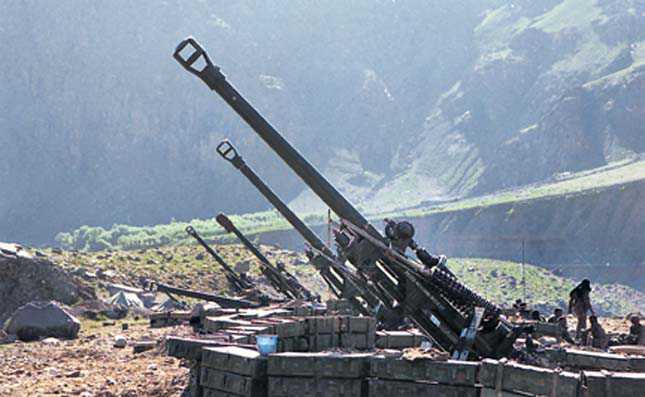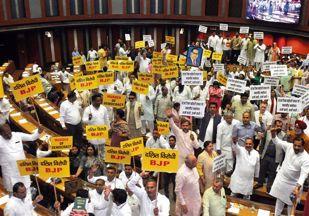
No ball of fire: Post-Bofors, a cautionary narrative has been adopted.
Air Marshal Brijesh D Dayal (retd)
AS part of the last Cabinet reshuffle, the erstwhile minister of state for defence was shifted to another ministry. At the time, media reports had suggested that the reason was his involvement in a major row during a meeting of the Defence Acquisition Council (DAC), chaired by the Raksha Mantri. He had reportedly blamed members of the Army and the defence acquisition wing for an unfair carbine selection leading to a single vendor, which was an Israeli company, and battled for the inclusion of a second vendor, even suggesting a CBI probe into the matter.
A recent report now mentions that this company is so frustrated with the delay in decision-making in the Ministry of Defence (MoD) that it is rethinking its investments in India. If, as reported, 70 per cent of the FDI in defence in the last two years has come from this company’s joint venture alone, it makes for very poor copy for the ‘Make in India’ campaign.
In financial terms this procurement proposal must be modest. That even this has resulted in a piquant situation points to a deeper malaise afflicting defence procurement, due to which defence modernisation and indigenisation continue to face an indifferent future.
The traditional tug-of-war in the endless file driven decision-making process has normally been between the user service and the civilian bureaucracy with the Minister normally being the proverbial rubber stamp. Indeed, one grouse that services often have is of Ministers letting the bureaucracy have complete sway, even as procurement proposals linger for years, if not decades, whilst operational capabilities wither.
While this episode does raise the interesting question of whether a change is creeping in where the smug bureaucratic order is being challenged within the South Block, one thing is certain; the Army’s wait for the carbine is destined to get longer, no matter what the cost in human life. They must continue to do with ‘what they have’, the pregnant expression used by the then Army Chief when the nation was faced with the prospect of wider conflict during the Kargil episode. Clearly, the one disposable commodity in our completely broken down defence procurement and modernisation process, is life of those in uniform, for whom there appears little parliamentary, ministerial or bureaucratic empathy.
If this sounds harsh, one needs to look back at the IAF’s requirement for an advanced jet trainer whose need was first spelt out in 1982. The first aircraft arrived after 25 years while its non-availability continued to take a heavy toll in terms of training-related accidents. Bharat Rakshak website data indicates 543 IAF aircraft losses during this 25-year period, of which a significant number were fighter aircraft and most attritions were indirectly attributable to this wilful procrastination.
The chequered history of defence procurements dates back to 1948 and the Jeep scandal, but it was the Bofors scandal in 1987 and the ensuing political controversy that resulted in procrastination becoming the process mantra. The services termed this the Bofors Syndrome, a mindset where few in the decision-making chain would venture to take decisions on merit for fear of falling prey to shenanigans of others in the complex procurement system.
This syndrome’s unique feature is that it works smoothly where government-to-government contracts are concerned, but goes into deep freeze when faced with an open tender purchase. This would explain the dichotomy of over $10 billion defence purchases from the US and much more from erstwhile USSR and Russia, but decades of procrastination for the MMRCA or the howitzer, or now even carbines!
There is an added fallout. Massive investments have been made in defence PSUs and ordnance factories, yet India is among the world’s leading importers of arms! One effort to address this imbalance was a proposal to select and co-opt some private enterprises and designate them as Raksha Utpadan Ratnas. The proposal remains stillborn precisely because the decision-making eco-system avoids the prospect of choosing amongst private parties.
As part of the post-Kargil review, the DAC was set up to expedite the procurement process. In 2002, the syndrome-afflicted ecosystem invented a new tool called the Defence Procurement Procedure (DPP). Over the years, so much anticipation and hype accompanies each DPP revision that every new edition appears to be an end in itself rather than a means to an end.
DPP 2016 was the ninth such version and the first under the NDA government committed to the ‘Make in India’ mission. There was an air of optimistic anticipation, especially with regard to private sector involvement, more so as a committee had proposed a ‘strategic partner’ model, wherein selected Indian private enterprises would exclusively make designated military platforms. Not surprisingly, the proposal is proving to be contentious and the subject of study by successive committees. But the crucial chapter on strategic partners was missing from DPP 2016, to be issued later. Clearly, the Bofors Syndrome is at play again.
The underlying spirit of successive DPPs no longer appears to be for delivering and sustaining effective and affordable war-fighting capabilities to the users within a specified time frame. Instead, arriving at a perfect and foolproof system on paper takes precedence over achieving the outcome.
Defence acquisition is a mission for committed professionals and not administrative generalists and uniformed specialists working on rotating assignments, burdened with other chores and pressures. Elsewhere, it is considered a full time profession where people train, specialise and work full time. The US even has a Defence Acquisition University committed to creating acquisition professionals.
If the outgoing MoS’s outburst and ministerial over-reach results in a grudging acceptance that we need to rethink our defence acquisition system and processes, with accountability of outcomes suitably factored, he may have provided yeoman service to the armed forces. If on the other hand, we continue to treat defence acquisition as a routine administrative chore, our Commanders will continue to face future threats with ‘what they have’. The nation should be prepared to bear the consequences.



























